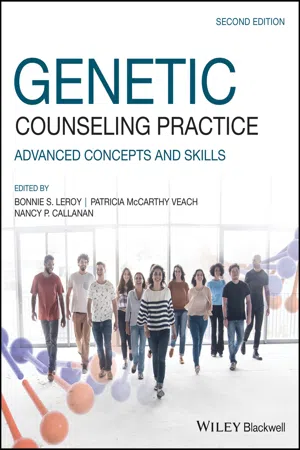
Genetic Counseling Practice
Advanced Concepts and Skills
- English
- ePUB (mobile friendly)
- Available on iOS & Android
Genetic Counseling Practice
Advanced Concepts and Skills
About this book
The second edition of Genetic Counseling Practice: Advanced Concepts and Skills, provides in-depth content regarding the advanced competencies for meeting patient needs across the changing landscape of genetic counseling practice. The content aligns with the Reciprocal Engagement Model (REM) of practice which integrates the biomedical knowledge and psychosocial aspects of genetic counseling.
This edition has been revised and expanded to reflect advances made in the present-day field. Edited by a team two genetic counselors and a psychologist, the chapters offer a holistic picture of genetic counseling. Chapter authors are all recognized experts in the profession. The chapters are grounded in evidence-based practice and research. Each chapter includes learning activities to help readers apply concepts and skills. Featured topic areas include:
- Meeting the needs of culturally diverse patients
- Addressing challenging patient dynamics
- Working with children, adolescents and families
- Using emerging service delivery models for genetic counseling
- Engaging in self-reflective, deliberate practice
- Promoting genetic counselor professional development
Genetic Counseling Practice is an indispensable guide to the complex and evolving field of genetic counseling, and this updated second edition will help practitioners and trainees alike navigate its most pressing and practical challenges with skill and care.
Tools to learn more effectively

Saving Books

Keyword Search

Annotating Text

Listen to it instead
Information
1
Introduction
Development of the 2nd Edition
Genetic counseling is the process of helping people understand and adapt to the medical, psychological, and familial implications of genetic contributions to disease. This process integrates the following:
- Interpretation of family and medical histories to assess the chance of disease occurrence or recurrence.
- Education about inheritance, testing, management, prevention, resources, and research.
- Counseling to promote informed choices and adaptation to the risk or condition.
(Resta et al. 2006, p. 77)
Reciprocal‐Engagement Model
- Tenet 1: Genetic information is key – Providing information about “perceived or known genetic contributions to disease” (p. 721) and engaging in discussion with patients about this information is a particularly unique aspect of genetic counseling.
- Tenet 2: Relationship is integral to genetic counseling – The quality of the relationship developed between the genetic counselor and patient is as important as genetic information. Genetic counseling “…is a relationally‐based helping activity whose outcomes are only as good as the connection established between the counselor and patient” (p. 721).
- Tenet 3: Patient autonomy must be supported – Patients should be as self‐directed as possible regarding genetic counseling decisions. The counselor is an active participant, working with the patient's individual characteristics and family and cultural context to facilitate informed decisions. However, an essential aspect of this tenet is that “the patient knows best” (p. 721).Tenet 4: Patients are resilient – Most patients have the strength to deal with p...
Table of contents
- Cover
- Table of Contents
- Title Page
- Copyright Page
- Preface
- About the Authors
- Acknowledgments
- 1 Introduction
- 2 Complicated Shadows: The Limitations of Autonomy in Genetic Counseling Practice
- 3 Actively Engaging with Patients in Decision‐Making
- 4 Risk Assessment and Communication: A Complex Process
- 5 A Genetic Counselor's Guide to Understanding Grief
- 6 Patient Anger: Insights and Strategies
- 7 Resistance and Adherence: Understanding the Patient's Perspective
- 8 Countertransference: Making the Unconscious Conscious
- 9 Supporting Family Communication About Genetic Conditions
- 10 Developmentally Based Approaches for Counseling Children and Adolescents
- 11 Cultural Competency and Genetic Counseling: Key Concepts
- 12 Cultural Competency: Application to Genetic Counseling
- 13 Education in Genetic Counseling: The Impacts of Genetic Literacy and Adult Learning
- 14 Adapting Genetic Counseling Practice to Different Modelsof Service Delivery
- 15 “Oh The Places You’ll Go!” The Genetic Counselor Professional Development Journey
- 16 Development of the Genetic Counseling Profession: A Professionalization Process
- Index
- End User License Agreement
Frequently asked questions
- Essential is ideal for learners and professionals who enjoy exploring a wide range of subjects. Access the Essential Library with 800,000+ trusted titles and best-sellers across business, personal growth, and the humanities. Includes unlimited reading time and Standard Read Aloud voice.
- Complete: Perfect for advanced learners and researchers needing full, unrestricted access. Unlock 1.4M+ books across hundreds of subjects, including academic and specialized titles. The Complete Plan also includes advanced features like Premium Read Aloud and Research Assistant.
Please note we cannot support devices running on iOS 13 and Android 7 or earlier. Learn more about using the app